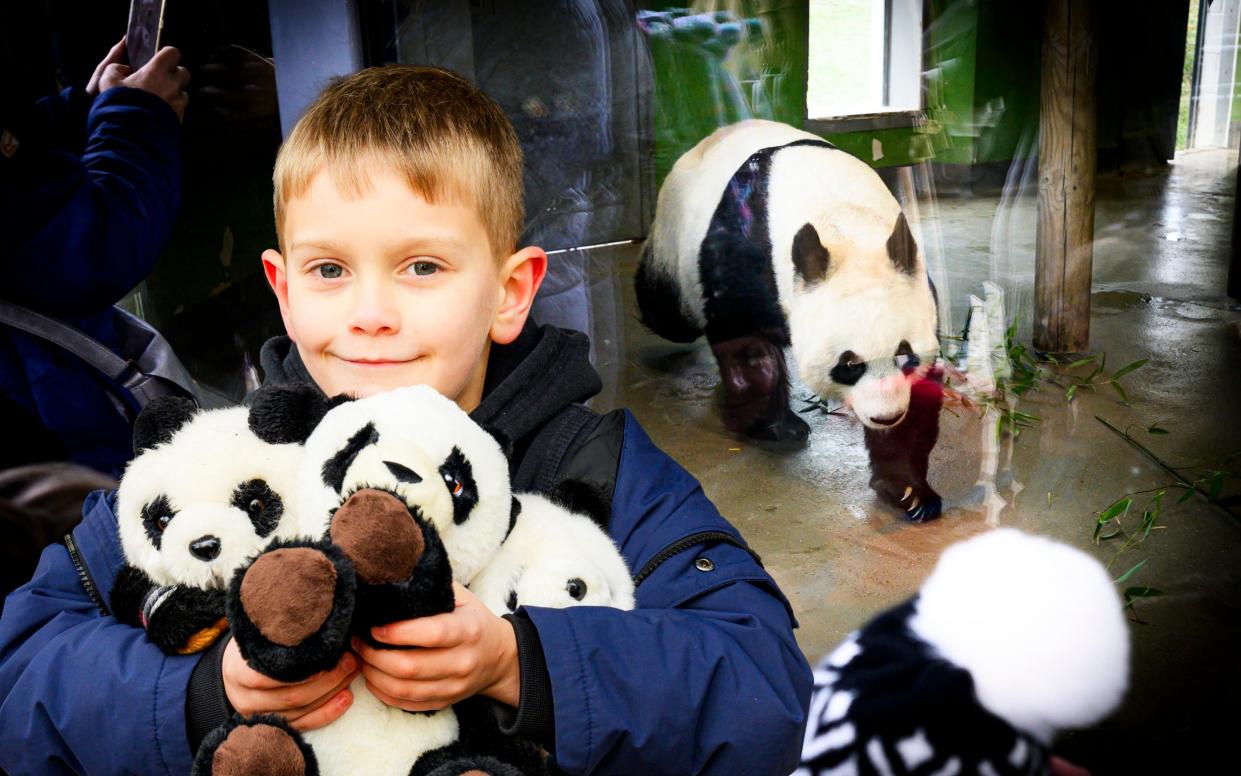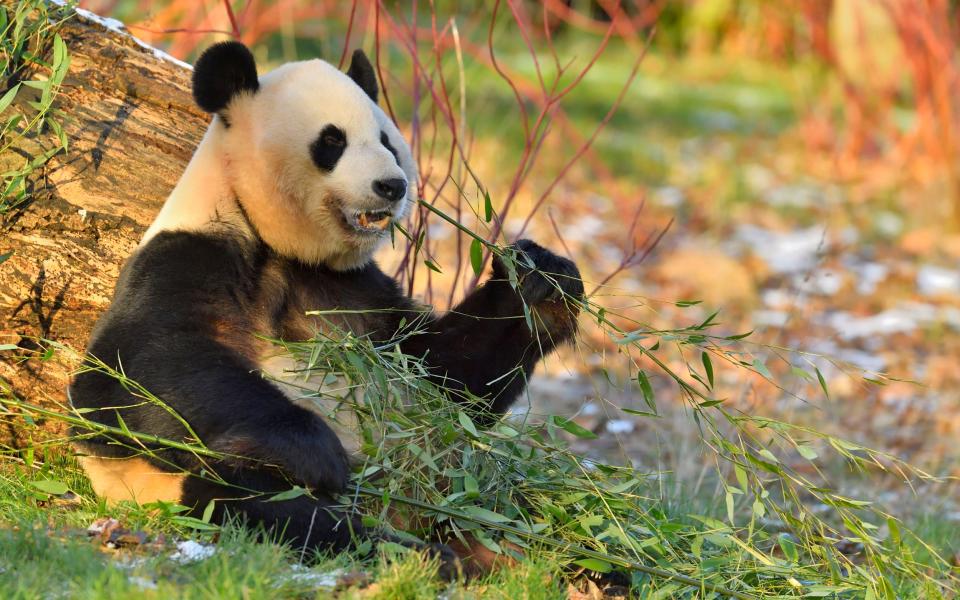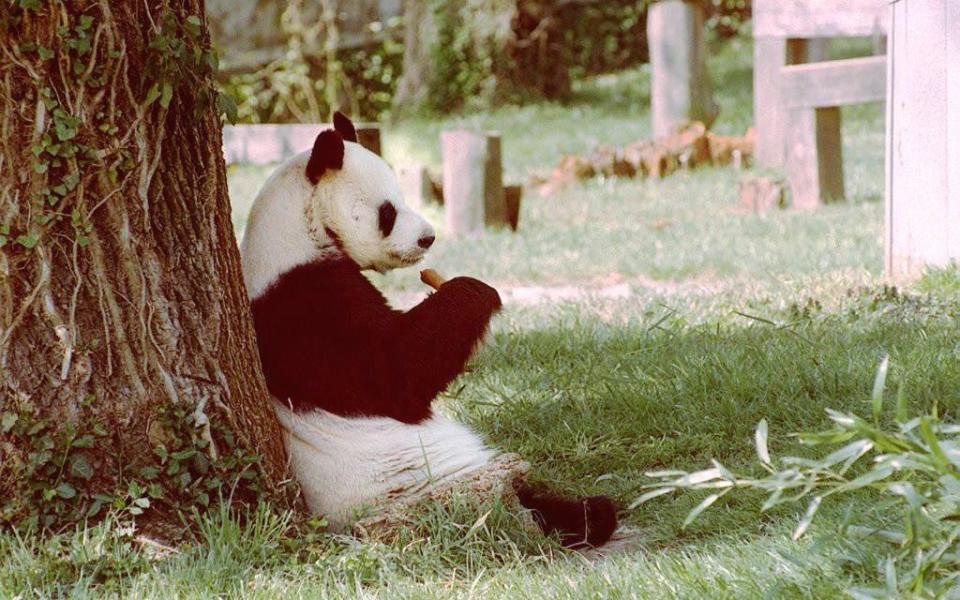Pandas are a bellwether of relations between China and the West – now, the last ones in Britain are going home

If Tian Tian and Yang Guang are nervous about their upcoming big trip, they are hiding it well.
Edinburgh Zoo’s most famous attractions roll, walk and snooze in front of the thronged tourists and locals, who have braved a frosty morning to pay their respects and say goodbye.
“We’ve flown up for the day, we must be mad,” says Lauren Darling, 35, from Ashtead in Surrey, who brought her “panda-mad” son Leo, seven, to see the animals. “But it had to be done. It’s a once-in-a-lifetime thing.”
“I think people won’t realise what they’ve lost until [the pandas] go back. When I was a child they had them at London Zoo. That was thirty-two years ago. So, we had to take the opportunity to see them. I’m so glad that Leo had the chance.”
For others, it is a final chance to see the animals that have brought much joy, and millions of visitors and pounds, to the Scottish capital since they arrived 12 years ago.
“We’re sad the pandas are going back to China,” says Rebecca Plant, 38, a conservationist from Leith. “We come quite often, so we’ve seen them quite a lot. I think it’s fine they’re going back.

“It’s not necessarily brilliant that they’re owned by the Chinese government and used by Beijing in their politics, but at least they’re being well looked-after here. I think loads of people will be sad they’ve gone.”
From Thursday 30 November, the giant pandas will be restricted from public view to begin a long journey of repatriation to China.
Their journey will begin with a period of quarantine, handled by keepers in special protective suits, before the animals will be put into custom-built crates and flown on a special plane – the details of the flight a closely guarded secret – back to their motherland.
“They’ll be going out in the next week – we’ve just got to finalise all the last health tests and get the final licences through,” said David Field, chief executive of the Royal Zoological Society of Scotland (RZSS).

He added that the pandas “have been introduced to their crates so they have their smells, their bedding and they feel comfortable in them. They are already sleeping in them.
“In colloquial terms they’re travelling in their beds. They’ll just bed down and sleep through most of it.” Hopefully there will be no pause in the in-flight entertainment.
Their final destination is yet to be confirmed, but it is thought they will initially spend some time at Bifengxia, a panda sanctuary in the mountains of Sichuan province, where they will be among around forty of their colleagues.
It is hoped that in these more relaxed environs, Tian Tian might be able to achieve what she never managed in Edinburgh, and breed. Despite their minders’ best entreaties, Yang Guang, which means ‘sunshine’, and Tian Tian, which means ‘sweetie’ remain childless, having had two failed pregnancies, in 2013 and 2015.
They are mates rather than mates. Perhaps Tian Tian will find love in the woods.
For the zoo, it is the end of an era. When the bears arrived by Panda Express in 2011, amid fanfare and streets lined with cheering wellwishers, it was the first time Giant Pandas had been kept at a British zoo since Ming Ming left London Zoo in 1994, 17 years earlier.

As with any celebrities worth their salt, the services of Tian Tian and Yang Guang had only been secured after years of negotiations between RZSS and the China Wildlife Conservation Association.
The loan was initially meant to be for a decade, with the RZSS paying £750,000 a year, but it was extended when the pandemic limited opportunities to see them. Over the years, the pandas’ keepers have learned their charges’ little ways. They woo them with honey and carrots and have taught them to open their mouths for inspection.
“Yang Guang and Tian Tian have been fantastic for Edinburgh Zoo and for Scotland, in terms of engaging millions of people with nature,” says Ben Supple, the deputy chief executive of the RZSS.

“Scotland has fallen in love with its pandas. That includes our staff, our members and so many of our visitors as well.”
Pandas have long been used for diplomatic purposes. Tang Dynasty records say the empress Wu Zetian sent two pandas to the Japanese court in the seventh century. More recently they have served as a bellwether of relations between China and the West.
China lent America its first pair of pandas as thanks for its support during its war with Japan. Over the following decades pandas were loaned to zoos across Europe and the US, even as the total numbers of Giant Pandas declined precipitously.
Peak panda diplomacy was in the 1970s, when President Nixon was presented with Hsing Hsing and Ling Ling after his breakthrough summit in 1972.

They were such a hit that in 1974, Edward Heath asked for, and received, two pandas, Chia Chia and Ching-Ching.
In 2007, the mainland gifted two pandas to Hong Kong to celebrate the 10th anniversary of the handover from Britain. Two were offered to Taiwan, too, but the offer was not taken up.
The gifted pandas gradually moved to loans, such as the Edinburgh pair. But the loans have dried up too. While there remains a smattering around Europe and Australia, in recent years China has kept its pandas closer at hand, even as numbers have swollen to the point it is no longer endangered.
As its economic and military clout has grown, China no longer needs to use its most charismatic fauna to curry favour abroad. The Chinese population wants its famous ambassadors to come home after their long tours of duty.

Similar retreats are taking place around the world. Earlier this month, three bears left Washington Zoo.
Conservation has moved on, too. There are no plans for more pandas at Edinburgh, which will convert the space for use by another species, to be announced in the new year. The Zoo’s focus is on species where it can make a more direct contribution to conservation efforts.
“AT RZSS we have a strategic pledge to reverse the decline of more than 50 species by 2030 and that’s about us directly working with partners on individual species. We don’t count the pandas among those 50, because we have a very indirect role in their conservation.

“It’s fantastic that millions of people have come to see the pandas and through their ticket money they’ve been able to support the conservation projects we do here in Scotland. But increasingly zoos around the world have a strong focus on direct conservation.
“The mood on site this week has been extraordinary and positive,” says Supple. “So many hundreds of people, waiting patiently to get a glimpse of these fantastic creatures.
“There will be a degree of sadness when we come to their last day, but it’s been such an incredible privilege to have Yang Guang and Tian Tian, and that’s going to be our memory of these giant pandas.

“We’ll maintain close contact with our colleagues in China, and be kept up to date with how the pandas are getting on. We know our colleagues are excited about these giant pandas coming back to them.”
It is the end of the black-and-white era at Edinburgh Zoo. But as they prepare for their long journey, if nothing else, Yang Guang and Tian Tian have shown that there is no finer diplomat than one who eats shoots and leaves.

 Yahoo News
Yahoo News 
